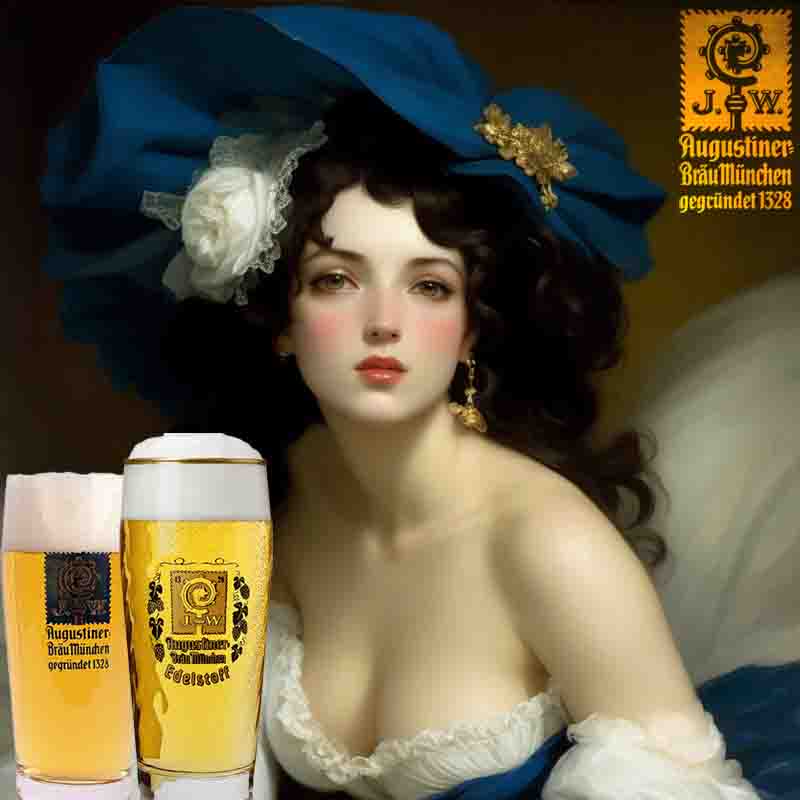Augustiner Beer: Best of the Best
Augustiner Brewery traces its roots back to the 14th century when it was founded by the Augustinian monks in the Bavarian capital Munich, Germany. The brewery was established within the monastery, and its early focus was on brewing beer to sustain the monks' livelihood and to serve the local community.

Augustiner Brewery's historical significance and reputation in Munich's beer culture transcend time. It stands as a living testament to the profound connection between tradition and innovation, heritage and progress.
Augustiner-Bräu is a historic brewery in Munich, Germany, with a legacy dating back to 1328, making it the oldest independent brewery in the city. The name "Augustiner" is derived from the Augustinian Brotherhood, as the brewery was initially associated with a monastery.
The Rich History of Augustiner Brewery
Augustiner Brewery stands as a cornerstone of Munich's rich beer culture and heritage, a testament to centuries of brewing excellence and tradition.
Founded in the 14th century by Augustinian monks, the brewery has etched its name into the history books as the oldest independent brewery in Munich.
Its enduring legacy and commitment to quality have solidified its reputation as a revered institution within the city's vibrant beer landscape.
Augustiner-Keller:
-
Arnulfstraße 52 - 80335 München
-
Open daily from 10am until 12pm
-
Reservation: +49 89 594393 - augustinerkeller.de
The rich portfolio of the Augustiner Brewery
From the classic allure of Lagerbier Hell to the refinement of Edelstoff and the vibrant personality of Weissbier, these brews tell a tale of tradition, innovation, and a dedication to perfection.
Augustiner Beer is not just a beverage; it's a testament to Munich's history, culture, and craftsmanship.
It's a journey through time and tradition, a taste of Bavaria in every sip, and a reflection of the enduring legacy of Augustiner-Bräu.
Augustiner Brewery's signature beer varieties are a symphony of flavors that pay homage to tradition while embracing the spirit of innovation.
Lagerbier Hell, Edelstoff, and Weissbier each tell a unique story, inviting enthusiasts to explore the nuanced world of Munich's beer culture.
| Product Name | Description | Type | ABV (Alcohol by Volume) | |
|---|---|---|---|---|
| Augustiner Lager | A traditional Munich Lager with a crisp, clean taste. | Lager | 5.2% | |
| Augustiner Weißbier | A classic Bavarian wheat beer with hints of banana and clove. | Wheat Beer | 5.4% | |
| Augustiner Edelstoff | A premium Helles Lager with a slightly sweet, malty flavor. | Lager | 5.6% | |
| Augustiner Pilsner | A refreshing Pilsner with a balanced hoppy bitterness. | Pilsner | 4.7% | |
| Augustiner Märzen | A rich, amber Märzen beer with a toasty malt character. | Märzen | 5.6% | |
| Augustiner Weizenbock | A strong, dark Weizenbock with a complex, fruity taste. | Wheat Beer | 7.5% | |
| Augustiner Radler | A light, refreshing Radler beer with lemon soda for a zesty twist. | Radler | 2.5% | |
| Augustiner Dunkel | A dark lager with roasted malt notes and a smooth finish. | Dunkel | 5.6% | |
| Augustiner Doppelbock | A strong, malty Doppelbock with caramel and toffee notes. | Doppelbock | 7.5% | |
| Augustiner Weißbier Dunkel | A dark wheat beer with a rich, fruity character. | Wheat Beer | 5.6% |
Augustiner-Bräu offers a diverse range of beer varieties, each with its unique charm. From the rich Edelstoff to the flavorful Weißbier, the balanced Pilsner, and the toasty Märzen, there's a brew to cater to every taste bud. Each variety is a masterpiece of brewing, crafted with precision and care.
Early Foundations and Monastic Origins
The Augustiner Brewery began its beer brewing journey within the walls of a monastery in the very heart of Munich.
Established by the Augustinian monks, the brewery initially served as a source of sustenance and livelihood for the religious community.
As the centuries rolled on, the brewery's expertise in brewing grew, contributing to its gradual transformation from a local monastery provisioner to an emblem of Munich's beer culture.
Transition to Modernity
The 19th century marked a pivotal era for Augustiner Brewery as it transitioned from monastic ownership to private hands.
Yet, its unwavering commitment to upholding traditional brewing methods and adhering to the principles of the Reinheitsgebot endured.
This transition, while altering ownership, maintained the brewery's essence and dedication to crafting beer of the highest caliber.
Contributions to Munich's Festive Spirit
Augustiner's contributions extend to the world-renowned Oktoberfest, Munich's annual celebration of beer, culture, and camaraderie.
As one of the festival's longstanding participants, Augustiner Brewery's presence brings an authentic touch to the festivities.
The brewery's specially brewed Oktoberfestbier captures the essence of the event, reflecting its historical significance and commitment to excellence.
A Cultural Landmark and Gathering Place
Over time, Augustiner Brewery evolved beyond its role as a mere producer of fine beers.
It metamorphosed into a cultural landmark, where locals and visitors alike convene to immerse themselves in Munich's beer culture.
The brewery's beer garden, with its lush decor and communal atmosphere, has become a center of conviviality and tradition.
Augustiner Brewery seamlessly weaves itself into the fabric of Munich's identity, bridging generations and fostering a sense of belonging.
Augustiner Brewery: A Timeless Legacy

As Munich's oldest independent brewery, Augustiner continues to define the essence of authentic Bavarian beer, leaving an indelible mark on the city's history.
Throughout its history, Augustiner Brewery has remained steadfast in its dedication to time-honored brewing practices.
This commitment to tradition has not only preserved the authenticity of its beers but also contributed to its enduring reputation for excellence.
With each sip of an Augustiner brew, one can taste the legacy of generations, the devotion of the monks who once nurtured its beginnings, and the passion of modern artisans who carry the torch forward.
Augustiner Beer History
The roots of Augustiner-Bräu trace back to a time when Munich was still a medieval city. Founded by Augustinian monks in 1328, it has evolved over centuries to become a cornerstone of Munich's beer culture
-
1328: The Augustiner-Bräu monastery brewery is founded in Munich, Germany by Augustinian monks.
-
1803: Secularization and the Napoleonic occupation lead to the end of monastic brewing, but the brewery continues under private ownership.
-
1829: Johann Nepomuk Müller takes over the brewery, and the Augustiner brand begins to grow in popularity.
-
1885: The brewery relocates to its current location in Munich's Neuhauser Strasse.
-
1927: Augustiner-Bräu merges with the Münchner Bürgerbräukeller, expanding its reach and influence.
-
1945: The brewery is severely damaged during World War II but quickly rebuilds to resume production.
-
1950s: Augustiner-Bräu becomes one of the six major Munich breweries, known as the "Big Six."
-
1980s: The brewery experiences a resurgence in the craft beer movement, attracting a new generation of beer enthusiasts.
-
2012: Augustiner-Bräu celebrates its 680th anniversary, emphasizing its rich tradition and heritage.
-
2020s: Augustiner Beer continues to be a staple of Munich's beer culture and is celebrated worldwide for its commitment to quality and tradition.
The Augustiner Beer timeline highlights the brewery's evolution from its monastic origins to its enduring presence as a Munich institution with a deep-rooted tradition of brewing excellence
The Renowned Augustiner Beer Garden: A Haven of Tradition and Togetherness
The Augustiner beer garden stands as a testament to the city's enduring love affair with beer, nature, and conviviality.
This iconic oasis, shaded by ancient chestnut trees and echoing with laughter, is more than just a place to enjoy a refreshing brew; it is a living embodiment of Munich's rich cultural tapestry and a sanctuary of shared experiences.
A Glimpse of Bavarian Gemütlichkeit
The Augustiner beer garden is a microcosm of Bavarian gemütlichkeit, a term that encapsulates the feeling of warmth, camaraderie, and coziness.
As locals and visitors gather under the canopy of leaves, a sense of kinship blooms. Tables laden with freshly poured Augustiner brews beckon people to unwind, converse, and relish in the simple pleasures of life.
Tradition Meets Nature
The beer garden's history dates back to the 19th century, when it emerged as an extension of Augustiner Brewery.
Its setting exudes a rustic charm, with wooden benches and long tables inviting people to find a spot amidst nature's embrace.
The chestnut trees that provide shade have stood witness to countless stories, conversations, and celebrations.
Augustiner's Lagerbier Hell, Edelstoff, and Weissbier are not just beers; they are expressions of Munich's soul.
Each variety captures a unique facet of Bavarian brewing, from the gentle hop bitterness to the rich malt complexity that defines these liquid gems.
Modern brewing techniques intertwine with age-old practices at Augustiner. The synergy of tradition and innovation yields beers that are not just drinks but eloquent stories in a glass.
Augustiner Beer culture in Bavaria
Munich beer culture is not just about the beer, but also about the traditions, get-togethers and good company.
Augustiner Beer plays a significant role in preserving this culture and keeping the city's beer traditions alive.
Munich's beer traditions run deep, and Augustiner Beer is often at the center of the festivities.
Augustiner Beer isn't just a beverage; it's a masterpiece that has withstood the test of time.
It's a taste of history, a connection to Bavarian culture, and a symbol of Munich's beer scene.
To fully appreciate Augustiner Beer is to immerse oneself in its rich history, savor its diverse varieties, and embrace the Bavarian beer culture.
It's a journey worth embarking on, and it's an art that continues to inspire generations of beer enthusiasts.
The next time you raise a glass of Augustiner Beer, remember that you're not just sipping a drink; you're tasting centuries of tradition and craftsmanship.
Augustiner Beer Collectibles and Memorabilia
The Augustiner Brewery does not advertise its beer. A simple brewery sign with the company logo is enough to attract guests to the beer bars. Of course, the Augustiner logo is also featured on the standard Augustiner Beer glasses.
With regard to beer collections and beer memorabilia, the Augustiner brand logo has become a popular and sought-after collector's item, especially in the context of beer wall art.
Augustiner: FAQ
Are you curious about music, art, technology, fashion, humanity, lifestyle, and beer?
If so, then you need to subscribe to the free Likewolf newsletter.
100% privacy. When you sign up, we'll keep you posted.
Beer, Brews, and Beyond
Take this comprehensive guide on a trip through the fascinating world of beer.
